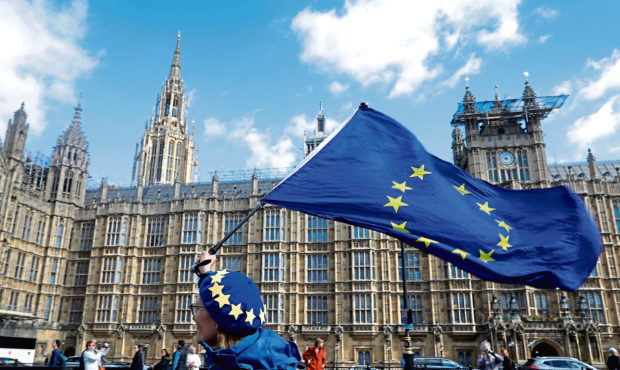‘Silly season’ is the often used term to describe the summer months while Parliament is not sitting — with MPs on their hols and politics on pause.
It is usually a period characterised by fanciful front pages and bizarre news bulletins.
This year the steady stream of Brexit pronouncements from the Government and Opposition, court challenges to Boris Johnson’s political tactics and the resignation of Ruth Davidson meant things remained rather more serious.
It was perhaps due to this news fatigue then, that many in the Westminster press pack chose to focus on the ridiculous when we met for the first major post summer briefing with the prime minister’s official spokesman on Monday.
Believe it or not, Mr Johnson’s new pet pooch dominated early exchanges, with more than 10 questions on the prime minister’s adopted Jack Russell. Everything from the pup’s name, age and sex, to whether he was toilet trained were up for discussion.
Conversations on the Downing Street dog were extinguished only when one reporter mentioned another animal, the ever present elephant in the room, Brexit.
The silliness didn’t end there however.
For the second time since Mr Johnson took office in July a question was put that, in more sober years, would have drew bewildered glances and caused outright amusement.
The first I recall was in July, when a Number 10 spokesman was asked whether the government was considering bringing back the death penalty. This was after the appointment of Priti Patel, who had previously written in favour of capital punishment, to the Home Office.
At Monday’s lobby briefing a second wide-eyed moment came with the question, “does the government believe in the fundamental principle of the rule of law?”. The response, which should have been a straightforward yes, was instead a finely balanced dance on the head of a pin.
We were told “every government adheres to the law” — but this was quickly qualified with: “The government will have to look at any legislation brought forward to establish what it does or doesn’t require”.
The response was hard to take in, not least given the basic assumptions of political norms in this country but also the fact that the very ministerial code Mr Johnson has signed up to stipulates that he must “comply with the law and protect the integrity of public life”.
This not-so-veiled threat to break the law was followed up with warnings that Tory MPs who disobey the prime minister on Brexit will face expulsion from the party. The list of potential rebels contains no less than two former chancellors and a former deputy prime minister.
What is Mr Johnson’s game here? His spokespeople have conveyed in the strongest possible terms that it is the fault of rebellious MPs that Brussels is not willing to renegotiate a Brexit deal, thus Mr Johnson needs to be tough to show that he truly means his “do or die” pledge to take the UK out of the EU come October 31.
It would seem therefore that everything, from accepted constitutional norms to the careers of Tory grandees, have been priced in as collateral damage in the battle to deliver the referendum result.
Although what that result means depends very much on who you ask. During the referendum campaign Mr Johnson and many of his comrades advocated a trade deal with the EU, some even suggested continuing in the single market. Now, it would seem, no-deal is the chief aim.
The central problem with no-deal is that it is being mis-sold as providing certainty, a clean break when it would in fact be nothing of the sort.
It encourages the public, who in large part are understandably fed up with the process, to believe that closure might be just weeks away. But this is not the case. The reality of no deal is that it would leave all the issues of our future relationship with the EU unresolved and leave it unclear whether there would even be a subsequent process to resolve them.
It would, in other words, be the end of the beginning, not the beginning of the end.
At the outset of summer I asked in these pages whether the Union could survive Mr Johnson’s Brexit strategy. With this hardened approach of purges and threats to ignore the law, it’s not clear whether the Tory party in its broad sense can survive either.
For evidence of that look no further than the comments made by former chancellor Philip Hammond yesterday morning/ He said he was going to “defend his party against incomers, entryists, who are trying to turn it from a broad church to narrow faction”.
His remarks could easily be attributed to a Labour MP battling the infiltration of the Militant Tendency in the eighties, but unlike that internal party civil war, Brexit is a total war. It has governed debate, policy and the news agenda for three years and shows no sign of abating.
Whatever the outcome over these next few weeks, election, no-deal, second referendum or anything in between, the Brexit silly season is here to stay.
Dan O’Donoghue is the Press and Journal’s political correspondent at Westminster
